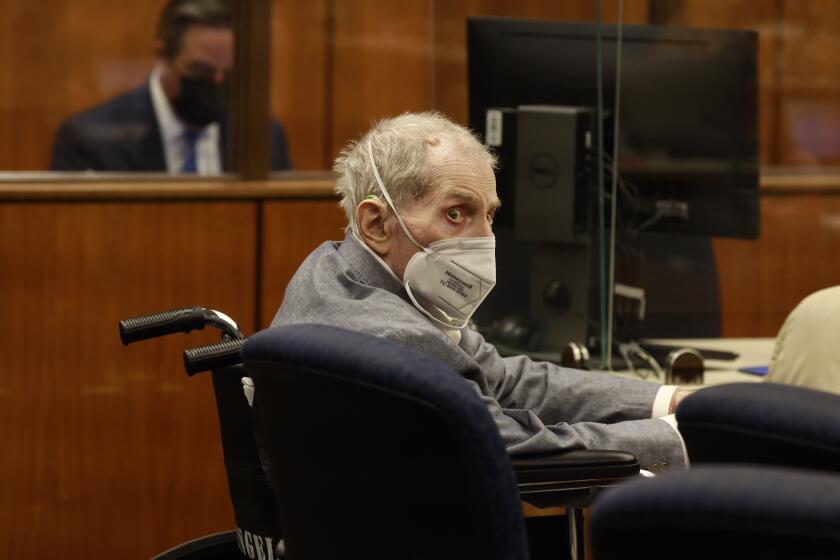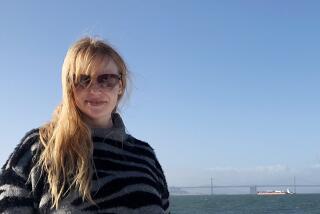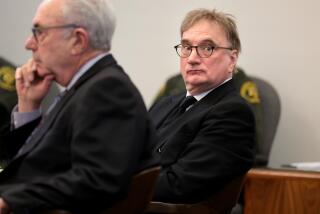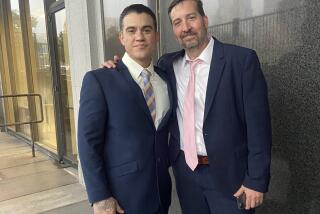Robert Durst convicted of murdering his friend Susan Berman
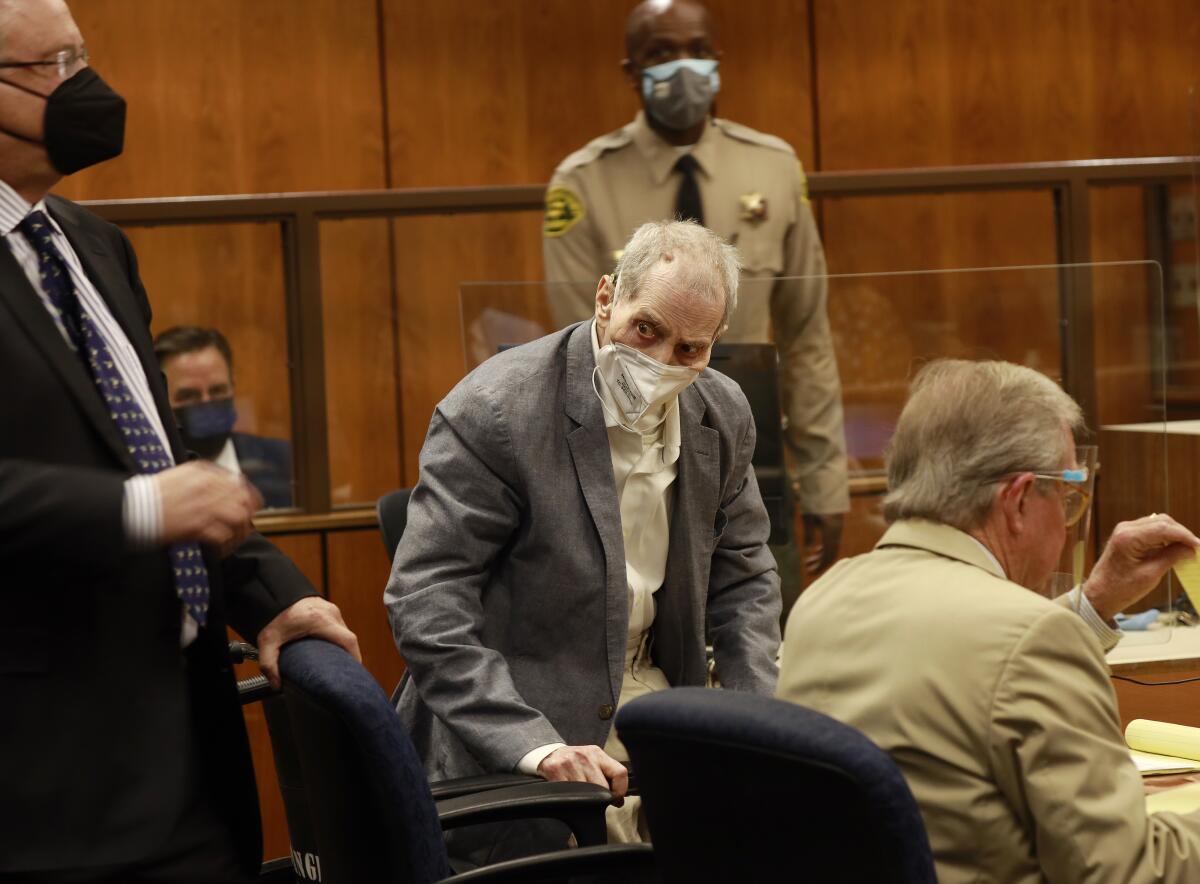
Robert Durst has spent the past 40 years as a suspect: in the disappearance of his first wife, the execution-style slaying of his best friend and the shooting of his next-door neighbor.
For decades, he flitted in and out of the national consciousness and police crosshairs, vanishing or living under a disguise whenever law enforcement or media scrutiny heightened around the deaths that marked his bizarre life.
But after a pair of trials in two states and his decision to take part in an HBO documentary that served up damning evidence against him, the slayings that have orbited Durst came full circle Friday, when a Los Angeles County jury found him guilty of murdering Susan Berman to cover up the disappearance of his first wife, Kathie McCormack.
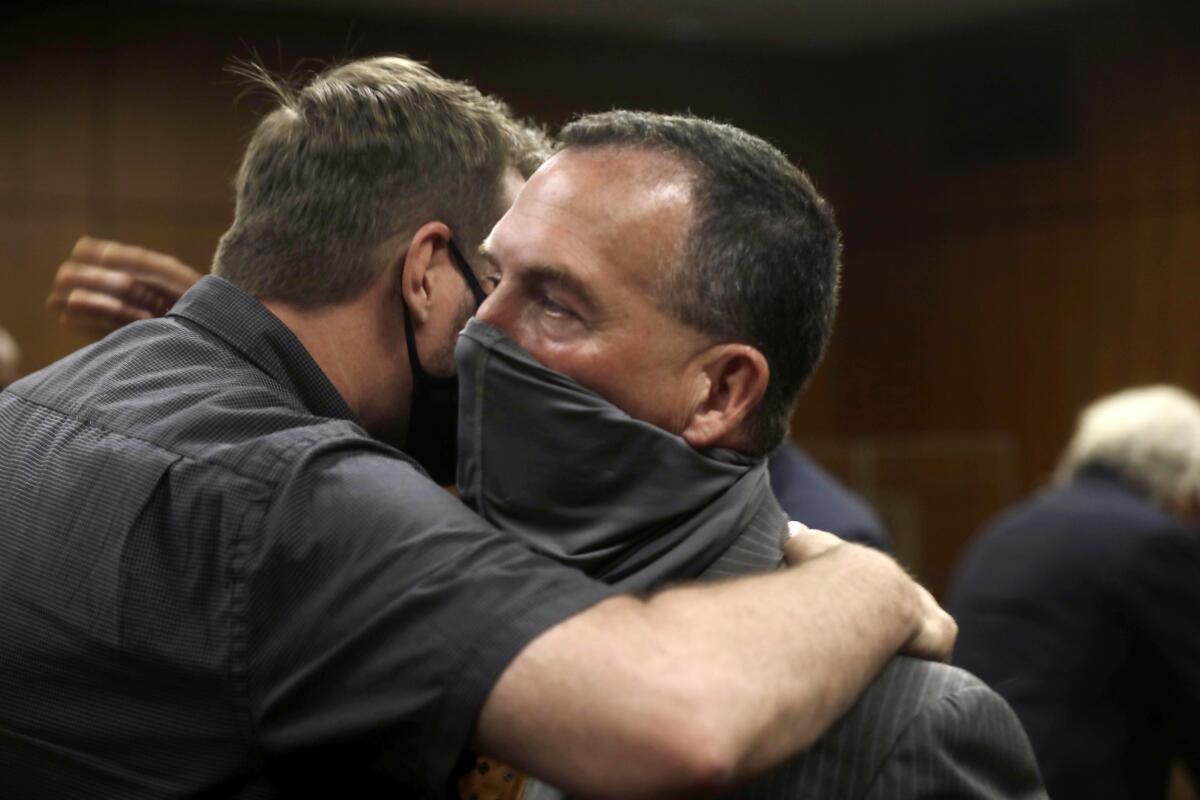
Following a five-month trial, but just eight hours of deliberation, jurors sided with the prosecution’s theory that the Manhattan real estate heir put a bullet in the back of Berman’s head in 2000 to keep her from telling New York police about the death of his wife nearly two decades earlier.
In the last in a series of odd twists in Durst’s saga, the 78-year-old millionaire was not in the courtroom as the verdict was read. Durst — whose failing health was made an issue during years of court proceedings — was held in isolation Friday after he was exposed to someone who tested positive for the coronavirus.
Absent the mercurial defendant, the Inglewood courtroom that housed the much-watched proceedings was silent as the verdict was read. It brought a muted end to a bombastic trial that saw Durst spend 15 days on the witness stand, where he engaged in tense and combative exchanges with Deputy Dist. Atty. John Lewin, the lead prosecutor on the case.
Jurors also upheld special circumstance allegations that Durst laid in wait and killed Berman because she was a witness. Under California law, Durst must be sentenced to life in prison without the possibility of parole, since prosecutors did not seek the death penalty. A sentencing hearing is scheduled for Oct. 18.
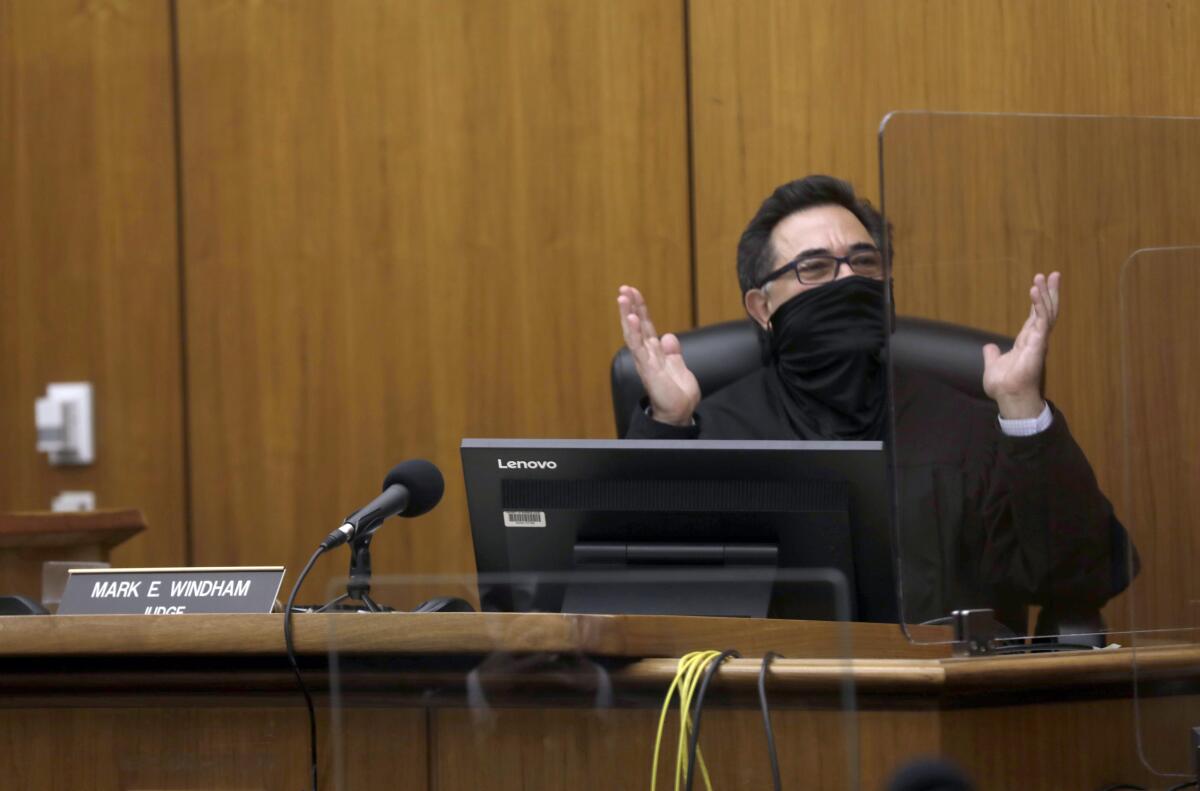
Attorney Dick DeGuerin — who in 2003 won Durst an acquittal on murder charges in Texas, even after his client admitted to dismembering the corpse of his neighbor Morris Black — said the real estate heir’s legal battle will continue on appeal. His co-counsel David Chesnoff said he believes there was “substantial reasonable doubt” in the case.
Outside the courtroom Friday, Lewin said jurors told him they believed that prosecutors had proven beyond a reasonable doubt that Durst had not only murdered Berman but also killed his wife and murdered Black.
Black was Durst’s neighbor in Galveston, where Durst had fled after learning authorities had revived the investigation into his wife’s disappearance. Durst testified in the Galveston trial that Black was shot in a struggle over a gun, after which he dismembered his neighbor’s body in a panic.
At the Los Angeles trial, prosecutors argued that Durst, who lived in Galveston disguised as a mute woman, killed Black because he had learned Durst’s true identity, threatening his continued freedom.
Lewin said jurors told him they did not find Durst’s testimony credible. He called Durst “shameless in his perjury” and that his time on the witness stand was “very helpful to us and very harmful to his case.”
Damaging as his testimony was to himself, Durst clearly relished the spotlight, Lewin said. “No matter how bad it was, no matter how much he was impeached, he loved it up there.”
To prove their theory of why Durst killed Berman, prosecutors spent weeks trying to convince the jury that Durst also killed McCormack, who disappeared in 1982 in New York.
While the trial ostensibly centered on the murder of Berman — who was found Dec. 24, 2000, in her Benedict Canyon home, with blood pooling around her head — it became a probing account of Durst’s entire life, one characterized by enormous wealth, strained relationships with family and a curious pattern of those closest to him winding up missing or dead.
Late Friday, the McCormack family issued a statement celebrating the jury’s decision and calling on prosecutors in Westchester County, N.Y., to bring the real estate heir to trial for the death of his wife.
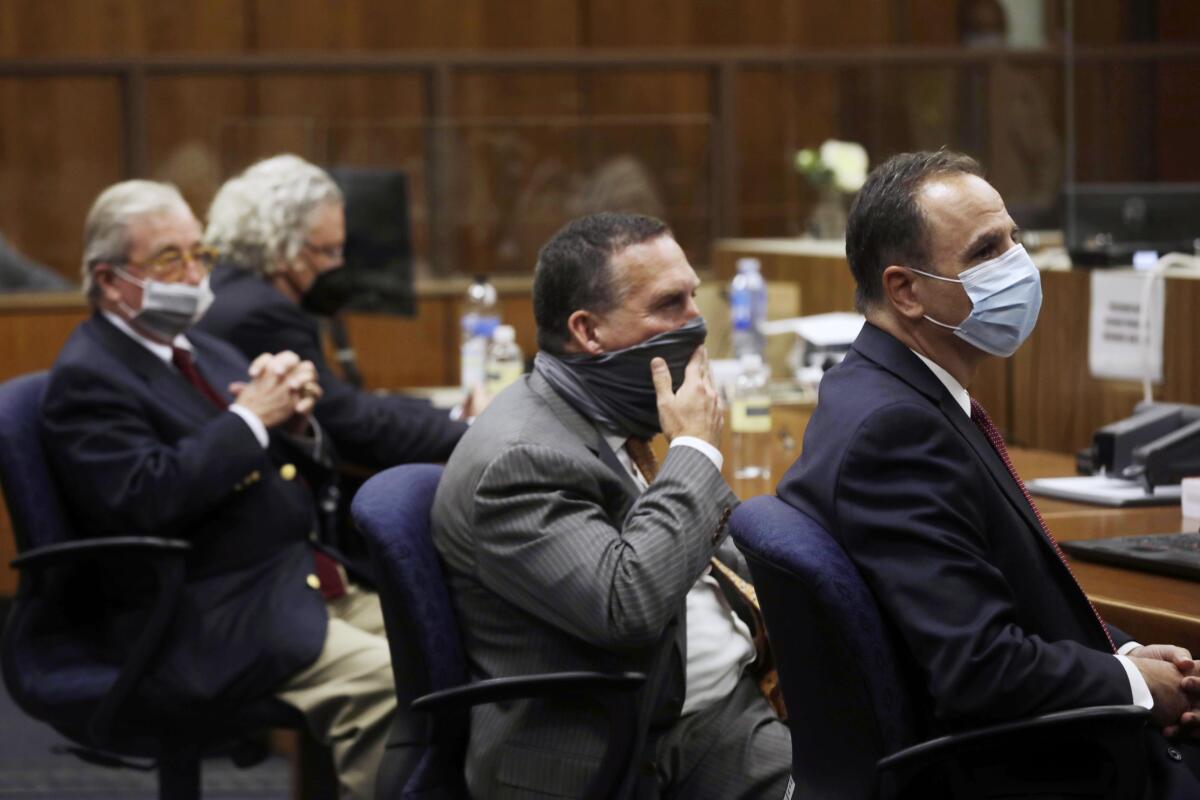
“The closing arguments by the Los Angeles deputy district attorneys should remove any doubt,” the statement read. “It’s bizarre and unacceptable that Durst was tried for killing an accomplice before being held accountable for Kathie’s murder.”
For five months, jurors heard testimony from prosecution witnesses, watched hours of Durst’s recorded interviews with law enforcement and filmmakers and scrutinized yellowing documents that Lewin used to meticulously paint the defendant as an ill-tempered loner who had little value for the lives or wishes of those around him.
A jury begins deliberating whether to convict Robert Durst of murdering his best friend, who allegedly helped cover up Durst’s killing of his wife.
Finally, after the prosecution wrapped its 11-week presentation, the jurors heard from Durst. After years of denying he was anywhere near Berman when she was shot, he testified that he found her body — a stunning admission that his attorneys referred to as “strategic” when they first hinted at the approach in a 2019 court filing.
Durst said he flew to California in 2000, intending to spend time with Berman, whom he befriended in the 1960s at UCLA. He let himself into her Benedict Canyon home with a spare key, he said.
“I did a double take. I saw Susan lying on the floor,” he testified. “I shouted, ‘Susan!’ a couple of times, then I quickly ran to the bedroom where she was. Her eyes were closed.”
Unable to reach the police from Berman’s landline, Durst said, he drove to a pay phone on Sunset Boulevard. He wavered, not wanting police to recognize his voice, and decided instead of calling to mail a letter to the Beverly Hills Police Department, telling them a “cadaver” was inside Berman’s home, he testified.
The note led to perhaps the most well-known moment of Durst’s 40-year legal odyssey.
In the final episode of “The Jinx” — an HBO documentary that revisited Durst’s connections to the deaths and disappearances of McCormack, Berman and Black — Durst was confronted with a letter he’d written to Berman in 1999. The document contained the same spelling errors and similar handwriting to those in the “cadaver” note. After being confronted, Durst went to a restroom and, unaware that he was being recorded, said chillingly, “What the hell did I do? ... Killed them all, of course.”
Many have taken the comments as tantamount to a confession, though DeGuerin argued at trial that the recording was deceptively edited.
Durst was arrested in New Orleans in 2015, just before the episode aired, but it would be a long road to trial. It took 18 months for him to appear in an L.A. courtroom, and prosecutors called for a number of preliminary hearings to archive testimony from older witnesses who they feared might die before trial. Two days after opening arguments began last March, the COVID-19 pandemic paralyzed the L.A. County court system, stalling the trial another 14 months.
Prosecutors said Durst’s account of finding Berman’s body defied logic. The only person with a motive to kill Berman, and the only person with the ability to get inside Berman’s home without a struggle, was Durst, Deputy Dist. Atty. Habib Balian said during his closing argument last week. While Durst had claimed he and Berman were at the time planning a Christmas “staycation,” Berman’s otherwise detailed day planner, presented by Lewin, contained no mention of Durst’s visit.
Instead, prosecutors said, Durst had traveled to California because Berman helped him cover up the death of his wife 19 years earlier. By his own admission, Durst had abused McCormack, physically and emotionally. Prosecutors argued that Durst killed his wife in 1982 inside their home in South Salem in Westchester County, N.Y.
The next day, a woman called a dean at Albert Einstein College of Medicine, where McCormack was studying to become a doctor. The caller identified herself as McCormack and told the dean she was too ill to come to class. That caller, the prosecution argued, was Berman. At the same time, Durst made calls from a pay phone in Ship Bottom, N.J., a beach town close to the state’s Pine Barrens forest, where prosecutors believe he disposed of McCormack’s body.
The daughter of a Las Vegas gangster, Berman had been raised to value loyalty above all else, friends testified. She held Durst’s secret for years, the prosecution argued, but over time, as her writing career floundered and her finances grew bleak, she began leaning on her old friend for money.
Prosecutors argued that Durst saw his friend in a new light in 2000, when New York authorities reopened the dormant investigation into his wife’s disappearance. Berman told Durst she’d been contacted by the police. They wanted to talk about McCormack.
“That was the moment Susan Berman sealed her fate,” Balian told the jury.
Durst, experts said, may have sealed his own fate: First, by talking to the makers of “The Jinx” and placing himself back under a withering spotlight; then, by his decision to take the stand, where Lewin was able to force him to admit to a number of self-serving fabrications, including a brutal exchange that closed a days-long cross-examination.
“Did you kill Susan Berman?” Lewin asked.
“No,” Durst replied.
“But if you did, you would lie about it, correct?” the prosecutor asked.
“Correct,” Durst said.
The back-and-forth was the end of what one lawyer saw as Durst’s self-destruction on the stand.
“He came off a bit arrogant,” said Dmitriy Shakhnevich, a defense attorney and assistant adjunct professor at the John Jay School of Criminal Justice in New York. “And the fact that he came off a bit arrogant plays into what could be a preconceived notion of him: that he is a rich guy from a rich family who has taken advantage of things that he was given.”
More to Read
Start your day right
Sign up for Essential California for news, features and recommendations from the L.A. Times and beyond in your inbox six days a week.
You may occasionally receive promotional content from the Los Angeles Times.
